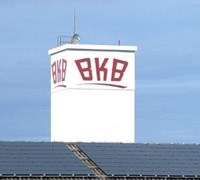Diversified South African agribusiness BKB made the announcement today, giving details of what is set to be one of the biggest solar power installation projects in South Africa.

BKB, which processes and exports two thirds of the South African wool clip and more than 35% of the country's mohair clip, said the installation will harvest and then introduce solar energy into its handling and shipping facility in Port Elizabeth. The solar PV system, which will cover a total surface area of 3,400 m², is located on the roofs of BKB warehouse buildings which house classing, handling and pressing facilities. The pitched roof sections of these buildings are now being retrofitted with approximately 4,680 solar panels, each with an output of 100 Watt. The solar array, which is expected to go online next week will generate 40% of the facility's electricity needs.
"It is the largest grid-tied solar PV system in the Eastern Cape and among the top 10 largest in the country," according to Rhino Energy director, Craig Brehany.
BKB plans to recoup the project's investment costs over a 10 year period through energy savings of approximately R850,000 ($70,894) per year.
The solar PV system is significant for the country's wool and mohair industries, and for approximately 28,000 emerging and commercial wool and mohair producers which BKB serves. "The clean energy supply chain management innovations through our solar PV system will offset the carbon footprint of wool and mohair processed and exported from our facilities. This will enhance the eco credentials of South African wool and mohair handled, pressed and shipped by BKB," said Jacobus le Roux, BKB head of corporate marketing and public relations.
The initiative forms part of the company's sustainability strategy and its fifth organisational value which promotes accountability and constant innovation for environmentally friendly sustainable growth. He said that the rooftop solar PV installation system is another stage of a four phase clean energy strategy with "real benefits and tangible outcomes" at BKB's facilities in Port Elizabeth. Earlier this year, the company installed energy efficient lights and sensors in the 95,000 m² property.
"We are deeply committed to becoming the country's leading low-carbon agribusiness. BKB will systematically introduce other initiaitves to introduce cleaner energy over the next fifteen years." Le Roux said BKB wants to set the pace and direction for the development of renewable energy alternatives within the South Africa agricultural economy.
"Our clean energy programme is one of several ongoing projects delivering real and meaningful transformation across commercial, social and environmental aspects of the industry and our business," he said.
Last year, BKB unveiled a public-private partnership initiative of R11m ($917,461) with the Coega Development Corporation to address unemployment, critical skills shortages in agriculture, and support the transformation of emerging farmers into commercial producers.